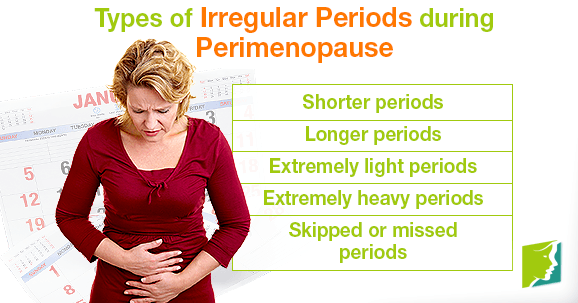Perimenopause is the stage when many women begin to experience irregular periods. The most frequently-experienced type of irregular periods are shorter and heavier bleeding periods.There are a number of other types of irregular periods as well, such as heavy or light bleeding. Below is a list of the various types of menstrual irregularities during perimenopause.
Types of Irregular Periods
Irregular periods can manifest in a variety of forms, including:
Shorter periods. This is when periods come more frequently, usually taking 21 to 25 days between cycles. It usually signals lower estrogen production during pre-ovulation stage and follicle stimulating hormone (FSH) levels are higher than normal. With more FSH being produced, your follicles are developing faster, which shortens your cycle.
Longer periods. Longer periods are those that last more than 35 days between menstruation. Usually this means lower levels of FSH.
Extremely light periods. This typically means your body isn't making enough estrogen to build up the uterine lining. It can also be a sign of an anovulatory period (a cycle without ovulation).
Extremely heavy bleeding. This is also a common sign of an anovulatory period, but in this case, estrogen builds up the uterine lining, and your body isn't producing enough progesterone. Without progesterone to stop it, the uterine lining keeps building up until the estrogen production finally drops off and the lining is shed.
Skipped or less frequent periods. This usually happens as you start edging closer to menopause. Over time, even high levels of FSH don't result in the production of enough estrogen for eggs to mature and for your uterine lining to thicken. As you approach menopause, your menstrual cycle usually lengthens. Periods come less frequently and there's more time between them. You may begin skipping periods, before they eventually cease altogether.
Recommendation
While the most common cause of heavy bleeding and abnormal periods in perimenopausal women is hormonal fluctuations, you should be aware that some irregularities in your menstrual cycle may not be related to perimenopause. They could be a sign of some other sickness such as cancer, polyps, non-malignant tumors, or fibroids. If you're concerned, talk to a doctor.
Sources
- Hutchinson, Susan M.D. "The Stages of a Woman's Life: Menstruation, Pregnancy, Nursing, Perimenopause, Menopause". November 2007.
- Love, Susan M.D. Menopause and Hormone Book. New York: Three Rivers Press, 2003.
- BMJ Group. "Menopause: What is it?" Patient Leaflet. 2007



